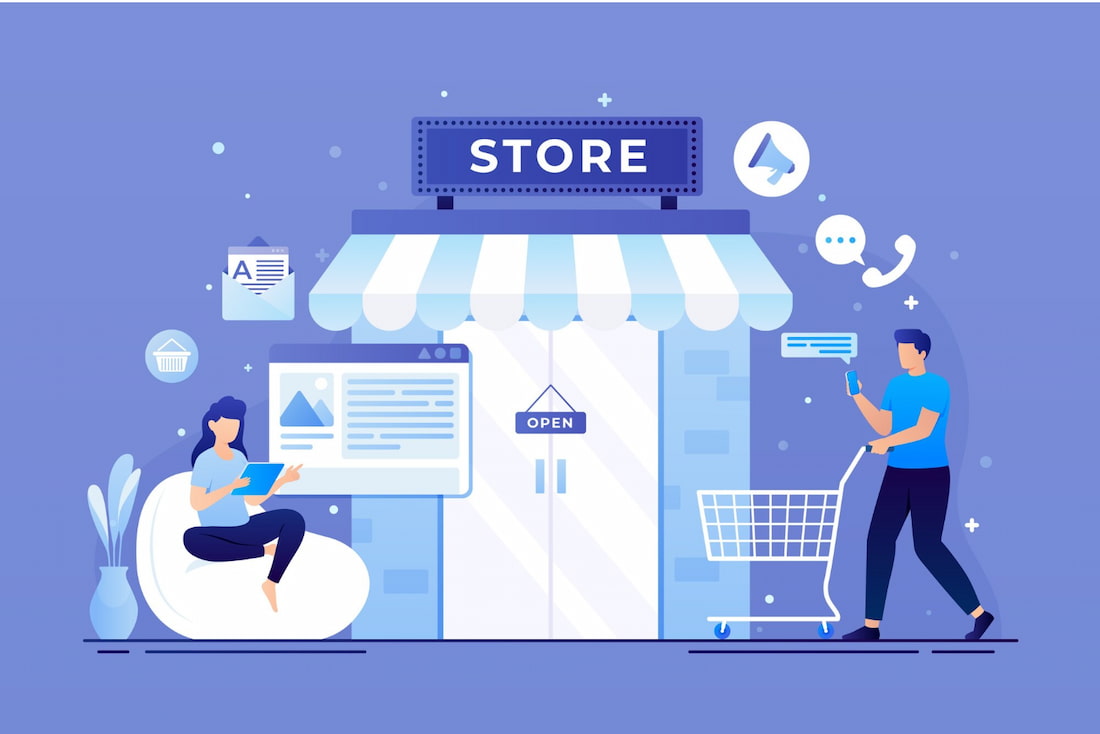Many online shop owners are becoming overwhelmed by the growing responsibilities of running their companies as the eCommerce industry continues to flourish. The list of duties may be overwhelming and includes anything from website upkeep and product listings to customer support and marketing. Here, outsourcing may make a difference.
You may concentrate on expanding your firm and enhancing its general effectiveness by giving specific jobs to professionals. We’ll lead you through five stages in this post on how to successfully outsource your online business.
Outsource eCommerce
In the context of an online shop, outsourcing is the practice of giving away certain facets or operations of the eCommerce enterprise to outside third-party service providers or businesses. By using the skills and resources of specialist service providers, online business owners are able to concentrate on their primary capabilities.
Website creation and maintenance, customer assistance, payment processing, order fulfillment, logistics, digital marketing, and even product sourcing are typical areas that firms often outsource in their online storefronts. Cost savings, scalability, access to specialized talents, and the capacity to maintain competitiveness in the ever-changing eCommerce environment are just a few advantages that outsourcing may provide.
To guarantee that outsourced operations correspond with the goals of the company and continue to provide the appropriate level of quality and customer satisfaction, rigorous vendor selection and management are also necessary.

Why Outsource eCommerce?
Cost Savings
A convincing way to sharply cut operating expenses is via outsourcing. You may save costs related to hiring internal workers, such as pay, benefits, office space, and equipment, which can result in significant savings, by choosing external service providers.
Access to Specialized Expertise
Through outsourcing, you have access to a network of specialized service providers that are professionals in their professions. The operations of your online business will be more effective and of better quality if you take use of their expertise, experience, and industry best practices.
Focus on Core Competencies
You may devote your important time and resources into essential company operations like product development, marketing, and strategic planning by outsourcing non-core services like website development, customer support, or logistics. This sharper emphasis on key capabilities may encourage development and innovation inside your company.
Scalability
Outsourcing partners often have the freedom to modify their services to fit your company’s changing demands. This scalability is crucial in times of seasonal change or fast expansion since it enables your online business to quickly adjust to shifting consumer needs.
Risk Mitigation
Working together with outsourced partners may be a powerful risk management tactic. A trustworthy payment processing business, for instance, may take on security and compliance duties, allaying worries about handling sensitive consumer data. This shared accountability lowers your online store’s overall risk profile.

Step-by-Step Guide on How to Outsource eCommerce
Step 1. Define Your Goals and Needs
It’s critical to describe your demands and goals clearly before you begin outsourcing. Analyze the current state of your online shop from a distance. What particular obligations or duties cause you stress or take a lot of time? Typical areas where outsourcing may be considered are:
- Website development and maintenance
- Purchasing and managing products
- Customer care and assistance
- Digital advertising and marketing
- the development of content (blog entries, product descriptions, and visuals)
- Order processing and delivery
After you’ve determined which areas need help, give each one a specific goal. You may choose the best outsourcing partners and gauge their effectiveness by being crystal clear on your goals.
Step 2. Choose the Right Outsourcing Partners
The success of your online business depends on choosing the appropriate outsourced partners. In order to make intelligent decisions, follow these steps:
- Research and Vet Potential Partners
Start by doing some research on freelancers or outsourcing firms. To evaluate their reputation and track record, look for reviews, recommendations, and case studies. Verifying their proficiency with the particular duties you’re outsourcing is crucial.
- Assess Communication Skills
Working with people or teams that are located remotely requires effective communication. Make sure your outsourcing partners can communicate effectively and quickly in the language and time zone of your choice.

- Evaluate Costs and Pricing Structures
Examine the expenses of outsourcing in relation to the gains you want to achieve. Some partners could impose flat prices, hourly charges, or provide unique packages. Pick a price structure that fits your demands and budget.
- Review Contracts and Agreements
Review contracts and agreements thoroughly before concluding any relationship to make sure all terms, such as timelines, deliverables, and confidentiality restrictions, are in accordance with your expectations.
Learn more about the Ethics of Outsourcing: Ethics in Contracting and Outsourcing for Website Creation
Step 3. Onboard and Train Your Outsourcing Team
After choosing your outsourcing partners, it’s time to efficiently onboard and train them:
- Provide Detailed Guidelines and Documentation
Make thorough paperwork defining your standards, procedures, and brand principles. This will make it easier for your outsourced staff to comprehend and maintain consistency with your vision.
- Conduct Training Sessions
To acquaint your workforce with the workings of your online business, hold training sessions based on the difficulty of the jobs. Continue to encourage them and address any questions they may have.
- Set up Efficient Communication Channels
Establish dependable channels for contact with your outsourced workforce, such as email, messaging applications, or project management software, to enable smooth interactions.
Step 4. Monitor and Measure Performance
To make sure your objectives are being accomplished, effective outsourcing entails ongoing monitoring and performance evaluation. This is how you do it:
- Set Key Performance Indicators (KPIs)
Establish KPIs that support your outsourcing objectives. These may be metrics like increased website traffic, sales, client satisfaction levels, or response times.
- Regularly Review Progress
Plan regular check-ins with your outsourcing partners to discuss progress and handle any problems or worries. Utilize these gatherings to share comments and make any required modifications.
- Use Project Management Tools
Use software and tools for project management to keep track of tasks, due dates, and project milestones. This may facilitate communication and guarantee that everyone is speaking the same language.

Step 5. Foster a Collaborative Relationship
Long-term success depends on developing trusting working relationships with your outsourcing partners. Here are some ideas to encourage cooperation:
- Maintain Open Communication
Ensure that you and your outsourcing staff have honest and transparent communication. Be attentive to their comments and advice.
- Provide Regular Feedback
Give your staff frank comments to help them perform better. Encourage them by praising and rewarding exceptional effort.
- Build Trust and Accountability
Any successful outsourcing collaboration is built on trust. Establish clear guidelines and make everyone responsible for their obligations.
Possible Cases and their Solutions of Outsourcing eCommerce
| Case | Solution | |
| Communication Issues | Time zone, linguistic, and technological differences may cause delays and misunderstandings. | Select outsourcing partners that are fluent in your desired language and time zone and have great communication abilities. Establish clear communication norms and use effective communication technologies. Meetings and updates that are regularly planned might aid in bridging communication gaps. |
| Quality Control | It might be difficult to ensure that outsourced work satisfies your quality requirements when you aren’t the team’s direct manager. | Establish precise quality standards and provide your outsourcing partners thorough instructions. Review their work often, if necessary, make suggestions for changes, and make use of quality assurance tools. Think about doing regular quality audits. |
| Data Security and Privacy | There may be security hazards involved with sharing private information with outsourced partners. | Select business partners that place a high priority on data security and compliance. Implement safe data transport techniques and encryption. Use confidentiality provisions and non-disclosure agreements (NDAs) in contracts to safeguard sensitive information. |
| Cultural Differences | Conflicts and misunderstandings may arise while working with outsourced teams from various cultural backgrounds. | Encourage your employees to be sensitive to and aware of cultural differences. Promote candid conversations regarding cultural distinctions and expectations. Encourage a cooperative, inclusive workplace that respects many viewpoints. |
| Scope Creep | Over time, outsourcing partners could take on more work than was originally planned, which might result in higher prices | The scope of the task should be clearly stated in your contracts and agreements. Keep an eye on current activities and make sure that any modifications or extra work are recorded, authorized, and subject to agreed-upon price increases via a change order procedure. |
Conclusion
Online shop owners wishing to simplify operations, lighten their workloads, and grow their enterprises may find outsourcing to be a potent tool. You may efficiently outsource jobs and concentrate on the strategic aspects of expanding your online business by adhering to these five steps: setting objectives, selecting the appropriate partners, onboarding and training, monitoring and assessing performance, and promoting teamwork. Your online firm may succeed in a cutthroat e-commerce environment with the appropriate partners and a well-executed outsourcing plan.

FAQs
What should I outsource for my eCommerce?
Website creation, maintenance, customer support, payment processing, order fulfillment, logistics, digital marketing, product sourcing, and content generation. Depending on the goals of a company which tasks to be outsourced.
How do I pick an outsourcing partner that is right for my online store?
Review contracts verify people test communication skills check prices. Pick contractors who know your outsourced tasks and meet your cost and quality objectives.
What are common challenges when outsourcing eCommerce and how do I deal with them?
The most visible ones are communication, quality assurance, data security and privacy, cultural differences, and scope creep. Pick partners with good communicators; make sure that data is well protected; promote sensitivity to the unique nature of cultures; and specify precisely what is in the scope of work in contracts while keeping watch for changes to overcome these troubles. Regular contact and feedback are applied to address and mitigate these troubles.
